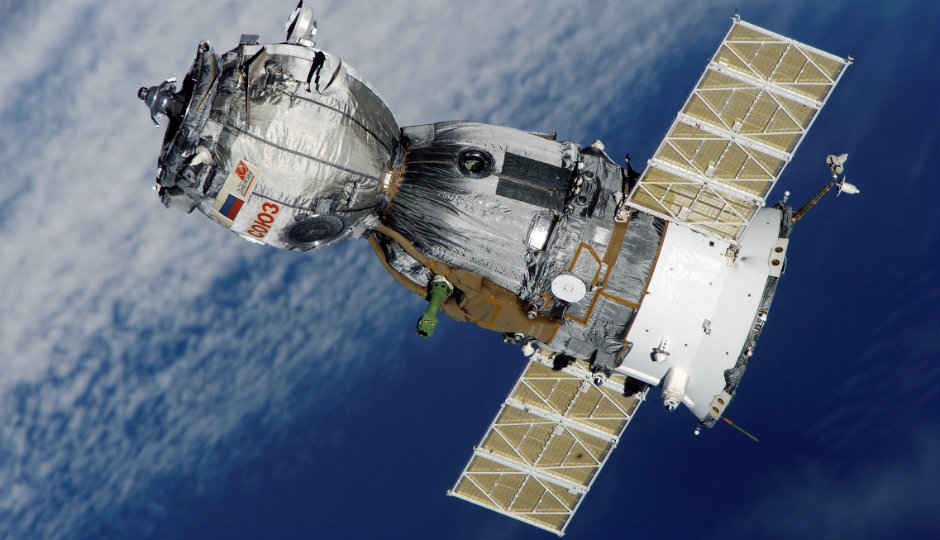Space station air leak could be the result of sabotage, say Russians
 A hole in a Russian Soyuz module docked at the International Space Station was discovered last Thursday. The hole caused an air leak and a drop in pressure, reports Agence France Presse. Investigation suggests that the hole was caused not by a micrometeorite strike but by a human being. Speculations say the hole may be the result of sabotage. According to NASA, astronauts succeeded in patching the two-millimetre hole with sealant and tape last Thursday morning after noticing the pressure drop the night before. The hole was discovered in the upper part of the docked Soyuz spacecraft in a module called the orbital module. Addressing the cause of the puncture, Space agency chief Dmitry Rogozin said in televised comments, "There were several attempts at drilling." According to him, the drill was held by a "wavering hand". He asked, "What is this: a production defect or some premeditated actions?" According to the report by Agence France Presse, the chief is not ruling out "deliberate interference in space." ISS Leak summary: First thought was MMOD strike. Then NASA released pics. Lots of people: "Hmmm, doesn't look like MMOD". NASA deleted the photos. Top Russian news site RIA NOVOSTI reported - via sources but apparently confirmed by Mr. Rogozin - it was a drill hole. pic.twitter.com/520kHK0TMc — Chris B - NSF (@NASASpaceflight) September 3, 2018 Rogozin added that identifying the saboteur and determining whether the drilled hole was an accident was "a matter of honour" for S. P. Korolev Rocket and Space Corporation Energia. According to RIA Novosti, a Russian news agency, the incident is currently being investigated by a special commission involving RSC Energia, Roscosmos, and TsNIIMash, which is a Russian institute of space and rocket science. In the meantime, RIA Novosti also reported that Maxim Suraev, a Russian federal politician and former cosmonaut, suspects a "mentally unstable member of the ISS crew" for the drill hole in the orbital module of the Soyuz spacecraft. The International Space Station is currently home to two Russian cosmonauts, three NASA astronauts, and one German astronaut from the European Space Agency.
A hole in a Russian Soyuz module docked at the International Space Station was discovered last Thursday. The hole caused an air leak and a drop in pressure, reports Agence France Presse. Investigation suggests that the hole was caused not by a micrometeorite strike but by a human being. Speculations say the hole may be the result of sabotage. According to NASA, astronauts succeeded in patching the two-millimetre hole with sealant and tape last Thursday morning after noticing the pressure drop the night before. The hole was discovered in the upper part of the docked Soyuz spacecraft in a module called the orbital module. Addressing the cause of the puncture, Space agency chief Dmitry Rogozin said in televised comments, "There were several attempts at drilling." According to him, the drill was held by a "wavering hand". He asked, "What is this: a production defect or some premeditated actions?" According to the report by Agence France Presse, the chief is not ruling out "deliberate interference in space." ISS Leak summary: First thought was MMOD strike. Then NASA released pics. Lots of people: "Hmmm, doesn't look like MMOD". NASA deleted the photos. Top Russian news site RIA NOVOSTI reported - via sources but apparently confirmed by Mr. Rogozin - it was a drill hole. pic.twitter.com/520kHK0TMc — Chris B - NSF (@NASASpaceflight) September 3, 2018 Rogozin added that identifying the saboteur and determining whether the drilled hole was an accident was "a matter of honour" for S. P. Korolev Rocket and Space Corporation Energia. According to RIA Novosti, a Russian news agency, the incident is currently being investigated by a special commission involving RSC Energia, Roscosmos, and TsNIIMash, which is a Russian institute of space and rocket science. In the meantime, RIA Novosti also reported that Maxim Suraev, a Russian federal politician and former cosmonaut, suspects a "mentally unstable member of the ISS crew" for the drill hole in the orbital module of the Soyuz spacecraft. The International Space Station is currently home to two Russian cosmonauts, three NASA astronauts, and one German astronaut from the European Space Agency.from Latest Technology News https://ift.tt/2NiOxME

No comments